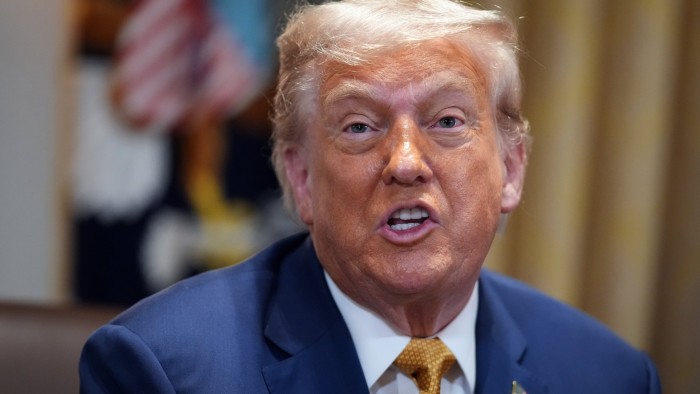Unlock the White House Watch newsletter for free
Your guide to what Trump’s second term means for Washington, business and the world
Donald Trump has said the US will impose big tariffs on copper and pharmaceuticals as the president steps up his global trade war.
Trump told reporters before a cabinet meeting on Tuesday that “today we’re doing copper”, adding that he believed the tariffs on the industrial metal would be 50 per cent. Trump also said the US could impose levies of up to 200 per cent on drug imports after an 18-month transition period.
Trump’s latest volley of new tariffs comes just a day after he sent letters to 14 trading partners, including Japan and South Korea, saying the US will hit them with steep levies from August 1.
He said on Tuesday other countries would be receiving similar letters in coming days, while warning that there would be no extensions beyond August 1 to strike trade deals. The president had on Monday pushed back the previous July 9 deadline to impose sweeping “liberation day” tariffs, initially unveiled in early April, citing ongoing trade negotiations.
The fresh round of tariffs pushes trade back to the top of Trump’s agenda, after recent weeks have been dominated by his vigorous, and successful, lobbying effort to push his flagship “big, beautiful” budget bill through Congress, along with the US’s air strike against Iranian nuclear facilities.
Howard Lutnick, Trump’s commerce secretary, said in an interview with CNBC that he expected the copper tariffs to be put into place as soon as the end of this month, or early August.
The threat of tariffs on copper, which is used extensively in electronics, construction and industrial equipment, sent US prices for the mineral soaring: futures traded on the CME Group’s metals exchange rallied 11 per cent to $5.58 per pound on Tuesday afternoon. Shares in Arizona-based copper miner Freeport-McMoRan jumped 3 per cent.
JPMorgan analysts noted that “the market will be surprised to the upside by the proposed number”, adding that the Wall Street bank had pencilled in a 25 per cent tariff rate for imports of refined metals.
Chile is by far the biggest supplier of refined copper to the US, followed by Canada and Mexico, according to the US Geological Survey.
Pierre Gratton, president of the Mining Association of Canada, said billions of dollars’ worth of energy infrastructure, such as copper piping, was shipped to the US as part of an integrated North American industry.
He added that the US did not have enough copper refining capacity or smelters and relied on Canadian imports of the metal, adding that such high tariff rates would “hurt US manufacturing”.
Trump also foreshadowed the results of an investigation into pharmaceuticals, which includes finished generic and brand-name drug products, and critical inputs such as active ingredients.
“We’re going to give people about a year, year and a half to come in, and after that they’re going to be tariffed if they have to bring the pharmaceuticals into the country at a very high rate, like 200 per cent,” Trump said.
The president said he would make an announcement on tariffs “very soon”. The S&P 500 pharmaceuticals index fell from the day’s highs after Trump’s announcement, but still closed 0.7 per cent higher.
With at least a year before tariffs kick in, Washington lobbyists said they did not pose a significant threat to pharmaceutical companies in the near term. “Classic Trump hyperbole,” said one lobbyist.
The US has already announced steep tariffs on autos and steel as a result of national security probes but has pending investigations into pharmaceuticals, copper, lumber, aerospace, chips and consumer electronics.
The series of probes into critical sectors, which are known as Section 232 investigations, has heightened uncertainty among US trading partners as they try to negotiate deals to shield themselves from Trump’s tariffs.
So far, only the UK has secured any form of relief from the sectoral tariffs. As part of its recent deal with the US, it was granted a reduced tariff of 10 per cent on a quota of 100,000 cars, instead of facing the 25 per cent tariff applied to most countries.
The US is also negotiating with the UK over a quota for lowered-tariff steel imports, and has pledged to negotiate carve-outs for British companies from the pharmaceutical tariffs.
Additional reporting by Ilya Gridneff in Toronto



